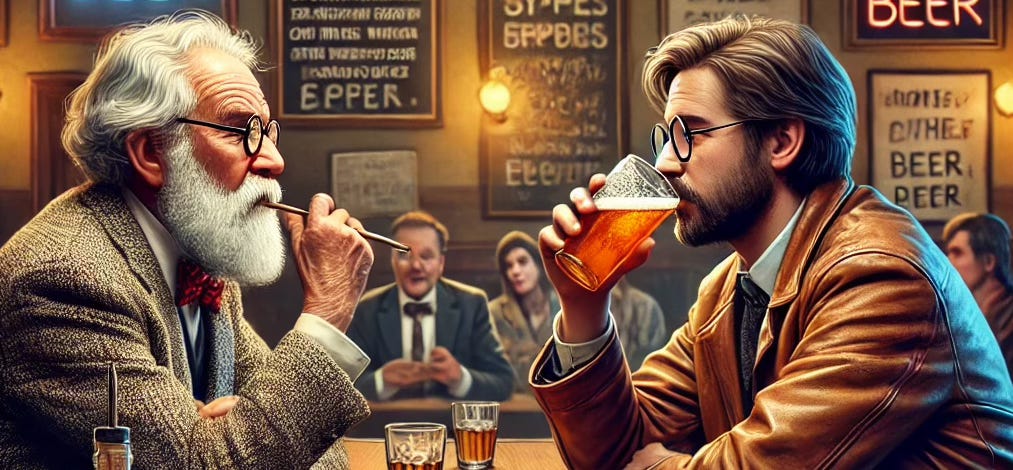A Rationalist and an Empiricist Walk into a Bar
A rationalist and an empiricist walk into a bar. It sounds like a joke, but tonight, it’s a battleground.
The rationalist, older in a tweed jacket, orders a scotch neat. “Because,” he says, “all things should be distilled to their essence.”
The empiricist, slightly frumpy in a weathered leather coat, orders a beer. “Because,” he counters, “life should be tasted as it is.”
They sit. They drink. And then, as always, they argue.
“You can’t trust experience alone,” the rationalist goes on. “The senses deceive. Look at optical illusions. Look at mirages! Pure reason is the only reliable path to knowledge.”
The empiricist scoffs. “And yet, you learned to talk by hearing words, not by deducing them. You learned to walk by trial and error, not through syllogisms. Experience precedes reason.”
The rationalist waves a hand. “Experience is messy. It leads to contradictions. Consider Zeno’s paradoxes—motion itself is an illusion if you rely on sensory input!”
The empiricist takes a slow sip of his life-at-it-is beer. “And yet, here we are. Moving. In a bar. Arguing.”
The debate escalates.
“Take mathematics,” the rationalist presses. “Two plus two is four. Not because we’ve observed it a thousand times, but because it must be true by logical necessity.”
The empiricist leans forward. “And yet, if a shepherd never observed his sheep wandering off, he’d be left with zero. Which he’d discover empirically when it was time for dinner.”
The standard hypothetical is mentioned: “If a tree falls in a forest—”
“—Then we measure the vibrations,” the empiricist interrupts.
“—But sound, as a concept, only exists in a mind to perceive it,” the rationalist counters.
It goes on like this, spiraling toward abstraction. Hands wave, eyebrows are raised, drinks spill, threats are made. The bartender, a weary but patient man, finally interjects.
“Gentlemen,” he sighs, “either order another round or shut the hell up!”
Both men turn on him, suddenly united. “Ah, the classic pragmatist,” the rationalist sneers.
“Hume with a hangover!” the empiricist smirks.
Then, the door opens. A woman walks in.
She moves over to the two men and asks, "which one of you will buy me a drink?"
The rationalist studies her symmetry, the way her features align in perfection. “Beauty,” he mutters, “is a function of ideal forms.”
The empiricist is looking at details—the wear on her shoes, the subtle hesitation before she came to the bar. “You’ve lived. You’ve seen things. You’re searching for something.”
Amused, she says, “You two are exhausting. Maybe I just am.”
The door opens again.
An artist walks in and glides naturally over to the woman. "Two vodka martinis, please," he orders. "One for me and one for the lady."
“Wow. Did I miss something?” the rationalist stutters.
“Makes no sense!” the empiricist staggers.
The bartender leans in, wiping one of the martini glasses. “Gentlemen, reason and evidence are fine, but timing is everything.”



